American View
Being Jewish
Building Community Far From the Madding Crowd
Jewish life is different outside of urban centers like New York, Los Angeles, Chicago and Miami, and the rabbis who choose to work in remote, relatively small congregations are a special breed. They face career challenges that don’t exist for their peers in larger communities. Most work part time because their synagogues can’t afford a full-time salary. Kosher food and Jewish cultural events are rare and, among the many tasks they perform, editing their synagogue newsletter appears to be a common one.
But there are also benefits unique to Jewish life in a smaller community, including a closeness and connection with congregants that rabbis at larger synagogues often don’t have time to develop. Hadassah Magazine spoke with three female rabbis working in different regions of the United States to find out what their roles—and their lives—look like.
Rabbi Sara Zober, Reno, Nevada
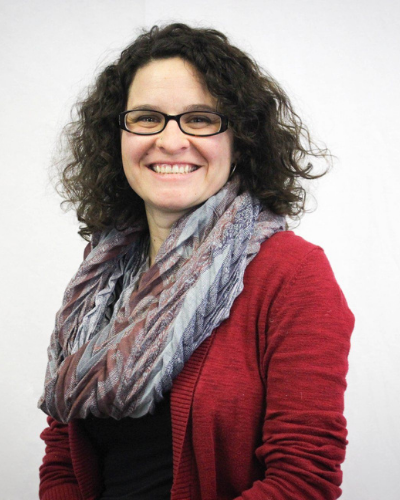
When Rabbi Sara Zober and her husband, Rabbi Benjamin Zober, were looking for their second congregation—the pair had met as rabbinical students at the Reform Hebrew Union College-Jewish Institute of Religion in Cincinnati and were ordained in 2017—they had certain requirements. One was that they both be hired for part-time positions. Another was that the town had to have “at least a minor league baseball team,” said Sara Zober. “Some people need a good Jewish deli, and we need baseball games. Reno fit the bill.” Last summer, she and about 50 other Jewish fans enjoyed the first Jewish Heritage Night at a Reno Aces game. And she took home a baseball cap with the team’s name written in Yiddish.
The Zobers had specifically sought a smaller congregation, which they found in Temple Sinai, with its 160 member households. Although an estimated 4,000 Jews live in the Reno area, just a few hundred affiliate with any of the three local congregations, which include a Chabad house and a Conservative synagogue.
“We decided it made sense to work together in a smaller place so we could be available to our kids and not burn out,” said Zober, who is in her late 30s. The couple has three children, ages 10, 11 and 13.
An upside to being in a relatively small community are the strong ties among members, she said. “Every simcha is a big simcha, and every tragedy is a collective tragedy,” she said. “Everyone whose funeral I do I know well. When someone new moves in, it’s so welcoming and warm. In Reno, everyone has to know and count on one another.”
That is true for interdenominational cooperation as well. Zober and the Chabad rebbetzin run the women’s chevra kadisha, or burial society. “If we’re not the chevra kadisha, there is no chevra kadisha,” Zober said. A group of male volunteers takes care of burial preparation for the men.
Collaboration extends to The Hebrew Cemetery of Reno, which also is overseen by volunteers. It is the only Jewish cemetery in northern Nevada, so it is used by all three congregations. When conflict arose over the questions of burying cremated remains and non-Jewish spouses, “it took a lot of negotiation” to resolve it, Zober said. “We ended up with yes” on both issues, “but had to make other concessions.” A new addition will have an Orthodox section in it, boundaried from the rest of it with no cremains and no non-Jewish spouses, she said.
WATCH NOW: CELEBRATING 50 YEARS OF FEMALE RABBIS
A virtual event featuring Rabbis Sally Priesand, Sandy Eisenberg Sasso, Amy Eilberg and Sara Hurwitz, all of whom made history by becoming the first ordained rabbis in their respective denominations.
At congregations with limited staff, tasks that go beyond what is generally considered the job of the spiritual leader fall to the rabbi. Zober, who is also principal of the synagogue’s 40-student Hebrew school, stayed late recently to vacuum cookie crumbs off the floor of the small social hall and mop the bathroom floors. In addition to editing the congregation’s newsletter, she inventories the supply closet and goes through the markers to discard those that have dried out.
Still, she said, the benefits outweigh the challenges. “The joy of being in a small city is that we only have each other.”
The flip side, though, is that in a congregation like hers, everyone is in everyone else’s business—even the rabbi’s. “When I go to the grocery store,” she quipped, “congregants literally look in my cart and comment on the bok choy.”
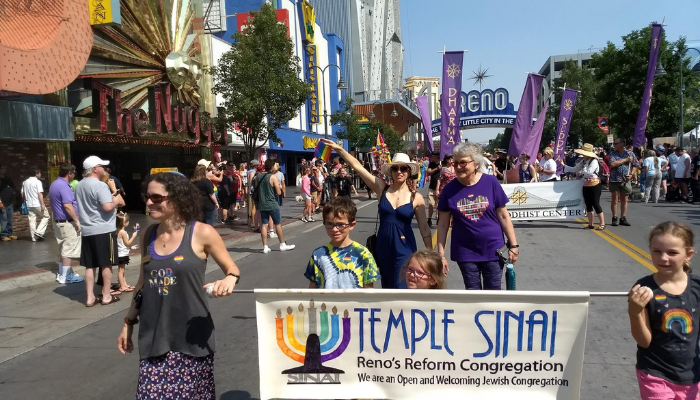
Rabbi Sonja Pilz Bozeman, Montana
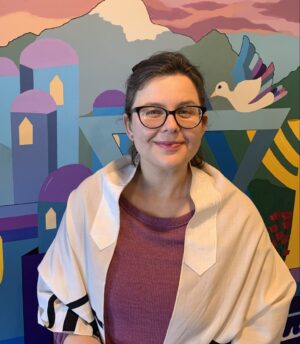
Bozeman is a world away from Freiburg, Germany, where Rabbi Sonja Pilz grew up and lived until just six years ago.
But Pilz, who is 37, married and a mother of a toddler, is enjoying the change. She is also introducing Jewish-themed nature activities at her synagogue, Congregation Beth Shalom, making the most of the big-sky, outdoorsy culture of the area. For Tu B’Shevat in January, 30 congregants aged 3 to 87 hiked on a nature trail while reflecting on themes and symbols of the holiday.
Pilz was ordained at the Reform movement’s Abraham Geiger College in Berlin. She moved to New York to study with liturgy scholar Rabbi Lawrence Hoffman at the HUC campus in Manhattan. For six years, Pilz lived in the Park Slope section of Brooklyn, working as editor of the CCAR Press, the publishing arm of the Reform movement, and teaching ritual and liturgy at HUC.
She had once considered becoming a professor of Jewish studies. But while she was part of the Egalitarian Jewish Bridge Chavurah in Freiburg, in southwest Germany’s Black Forest, she was involved in many aspects of congregational life, including teaching Torah, preparing b’nai mitzvah students and serving on the chevra kadisha. Over time, she was drawn to the idea of pursuing all those roles as a congregational rabbi and opted for rabbinical school.
When board members of the 40-year-old Beth Shalom first offered her a position several years ago, Pilz was single and turned it down. “There was no way I could pack up and move to Bozeman by myself,” she recalled, noting the remote, frigid locale. A couple of years later, she was married and pregnant, and the board offered her the job again. This time, she said yes, and began her position in July 2021.
READ MORE: The Would-Be Rabbis
About half of Beth Shalom’s 130-member households are retirees, many from large cities like New York City and Los Angeles, drawn to what she described as a “rapidly growing, increasingly expensive hipster town” close to Yellowstone National Park. People come to the area “because they want more space, not because they want to lead the most Jewish lives in the world,” Pilz said, adding that they come with “many different perspectives on what Jewish life is supposed to be.”
Her goal, she said, “is for the people who are here now to create a Jewish life that is as deep, vibrant and as spiritual as possible.”
Living in Bozeman, she said, “is a different kind of rabbinic challenge than it would be living anywhere else. But I am well prepared, coming from diverse, fractured Europe. Options here are rare, compromises have to be made and life has to be lived.”
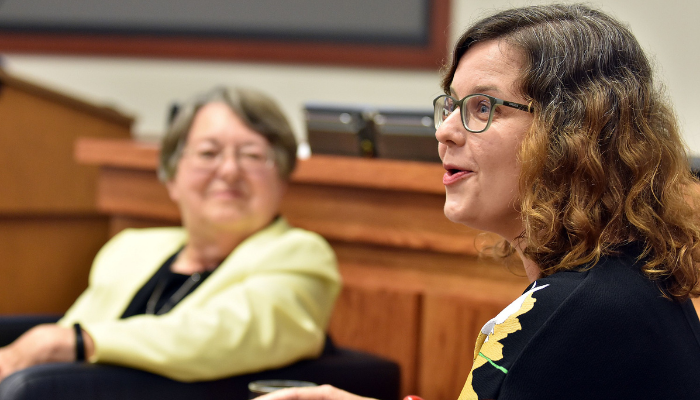
Rabbi Nancy Tunick Florence, Alabama
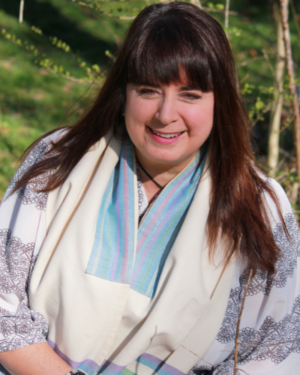
Music drew Rabbi Nancy Tunick to Nashville, Tenn., as it does for countless musicians each year. A former Warner Bros. Records executive, Tunick now has her own music promotion and marketing business. Music also connected her to Temple B’nai Israel in Florence, where she started more than 20 years ago as a cantorial soloist for the High Holidays and now serves as its part-time rabbi, though she still lives 100 miles away in Nashville.
B’nai Israel, which has 40 member households and is denominationally unaffiliated, is near the city of Muscle Shoals, Ala., where Aretha Franklin and the Rolling Stones once recorded. Not surprisingly, this spiritual leader weaves music through her rabbinate.
“Music is the centerpiece of our worship services,” said Tunick, who during the pandemic has led the services remotely from her home piano. The 55-year-old mother of two teenagers—who lost her husband to a heart attack a year ago—wrote her own tunes for most of the prayers at B’nai Israel.
Each tune, she said, was written for a specific congregant or occasion. Tunick also composes a song for each life-cycle event celebrated by congregants. The wedding of a young woman whose own baby naming Tunick led is scheduled for 2023, which will make the bride the first congregant to have two original songs composed for her.
READ MORE: Blu Greenberg Is Still Advocating for That Rabbinic Will
The congregation is sometimes joined by local musicians connected to Muscle Shoals studios. “We have a community of creatives, many excellent musicians who live in the area and periodically contribute to the service,” said Tunick. “It allows us to combine traditions and musical contexts so that the music is influenced by the community.”
Although she studied with cantors, Tunick didn’t pursue cantorial ordination. She was, however, hired as a cantorial soloist at B’nai Israel in 2000, leading High Holiday services with a part-time rabbi. In 2008, the congregation, which is over 100 years old and started as an Orthodox shul, invited her to become their sole spiritual leader. A few years later, with their financial backing and moral support, Tunick attended the Jewish Spiritual Leaders Institute, a small, nondenominational ordination program in New York City designed for people already working as congregational leaders. She was ordained as a rabbi in 2013.
The congregation, most of whom are over 65, is tight-knit, said Tunick. Before the pandemic, she said, members went out to dinner together after services on Friday nights. When they go to the symphony, they also go with each other. “You are involved in congregants’ lives in ways that transcend synagogue,” she said of her own relationships. “There is a blurry line between clergy and family and friend. That changes the dynamic. We are in this together.”
They worry about the future together as well. When congregants’ children go to college, “they don’t come back,” she said. Occasionally, new Jewish professors at the University of North Alabama or doctors at the local hospital join.
Streaming services on Facebook during the pandemic has expanded their reach. Between 100 and 200 people watch every service, Tunick said, and some as far away as England and Mexico have become dues-paying congregants.
“There is definitely a feeling of optimism” that the livestreaming, which will continue post-pandemic even as they return to in-person services, will contribute to congregational growth, she said. “The board feels like that model could support the congregation for many years to come and allows the aging community to have some hope.”










 Facebook
Facebook Instagram
Instagram Twitter
Twitter
Rabbi Cantor Robbi Sherwin says
As the Rabbi Cantor in Ketchum/Sun Valley, Idaho (and the only female rabbi in the entire state) and previously in Crested Butte, Colorado, I am familiar with small-town Jewish life – the why’s and how’s of trying to meet all congregants needs when the Judaism we grew up with does not exist AND the truism of “two Jews, three opinions” rules. People don’t come to the ends of the earth to find their grandmother’s Judaism, but in the mountains and trails, the wildflowers and wildlife, we find ways to connect to God in a way that is part of the pioneering spirit of our ancestors – if they lived in the mountains! Be it Shabbat services on skis or hikes on Tu B’shevat to appreciate God’s gifts of this earth, connecting to Judaism through nature, and through the closeness of small town Jewish life is unique and fulfilling. What a mechaiyah to read about my sisters, who, like myself, find ways to transmit our Judaism outside the mainstream.
Rabbi Judy Ginsburgh says
Thanks for highlighting 3 women in small town congregations. I, too, serve as a part-time Rabbi at Temple B’nai Israel in Monroe, Louisiana. There is no other Jewish congregation for almost 60 miles in any direction. We are it and the congregation has an over 150 year history in Northern Louisiana. These small congregations and their congregants are unique and it takes a certain type of Rabbi to meet these needs and continue to build community. I am proud to serve in this capacity where I really get to know each family and every day is a new adventure and an opportunity to teach and share.